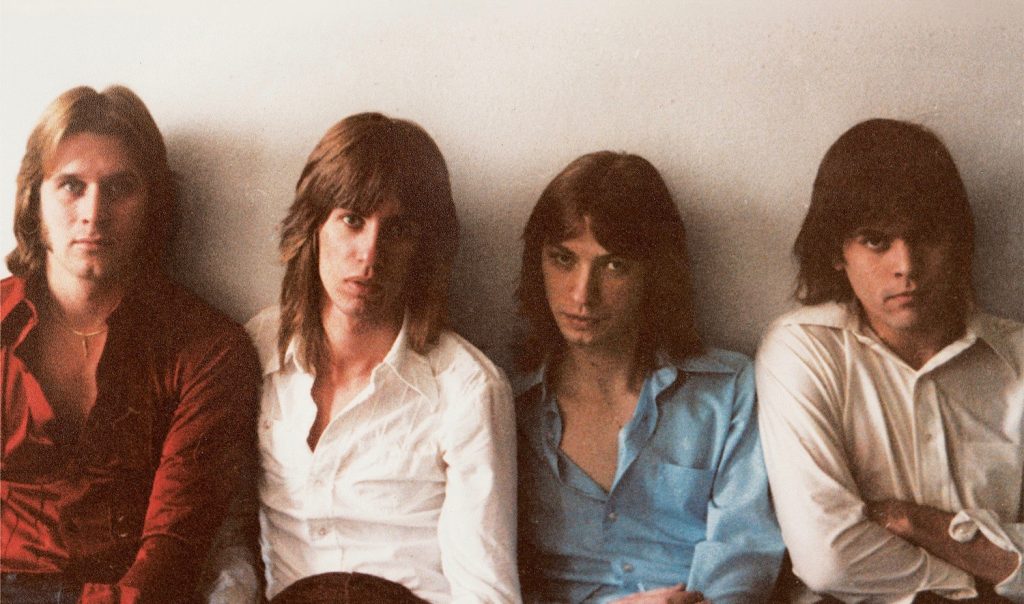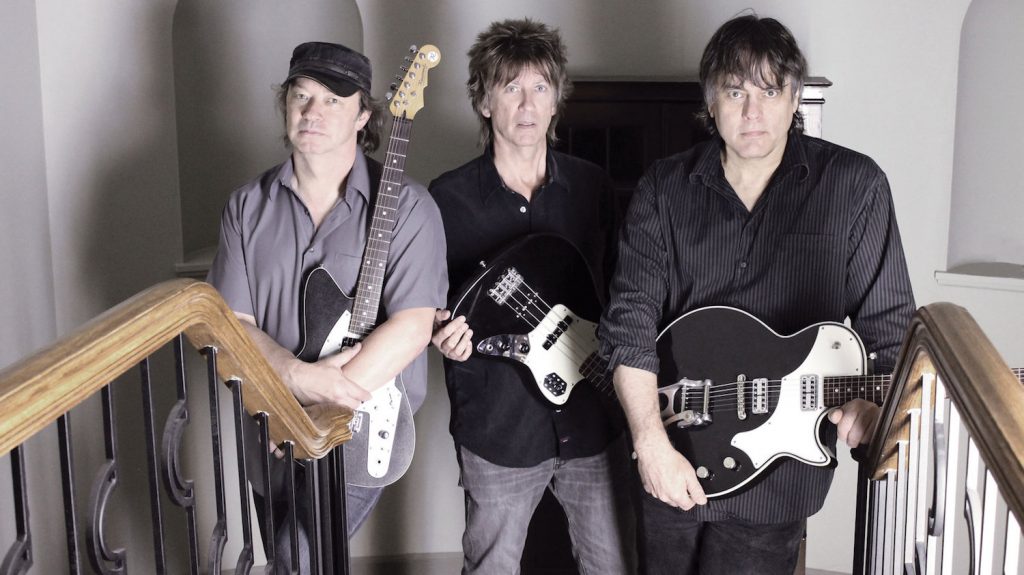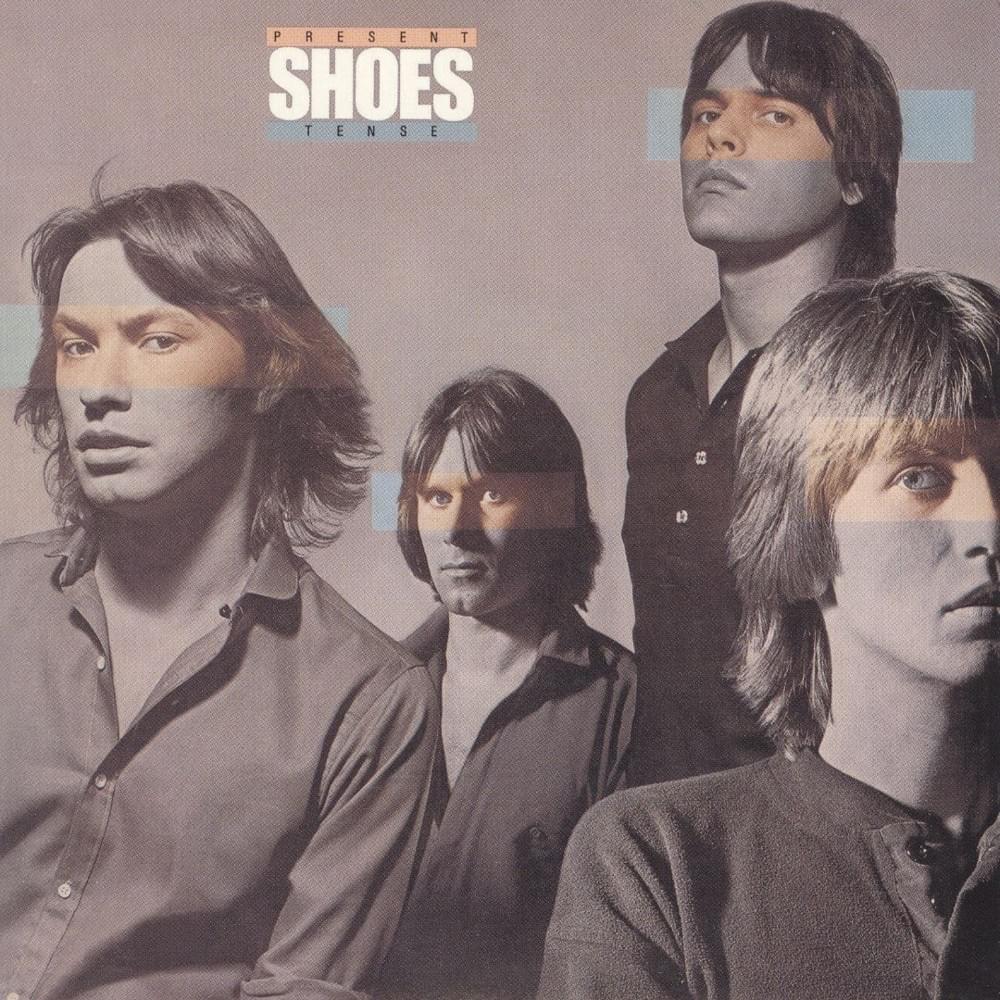
Whether you call them rock, pop or (that much-maligned label) power pop, Shoes have made some of the most crunchy-yet-melodic music over the last few decades. Present Tense, their 1979 major-label debut, is one of rock’s greatest woulda/coulda/shoulda been stories. Although it didn’t make Shoes a household name, the album continues to inspire other musicians and satisfy connoisseurs of fine pop/rock with its hook-filled songwriting. On Present Tense‘s 40th anniversary, MAGNET spoke with singer/guitarist Jeff Murphy about the LP, changing production techniques and what’s next for Shoes.
It’s been four decades since the release of Present Tense, and it sounds as fresh today as it did then. Looking back, are you happy with how it turned out? When did you last give it a listen?
Glad to hear that you feel that it still sounds fresh. We’d like to think that the quality of the sounds shines through, regardless of the production techniques of the era. Often times using the “newest, latest” instrument or gadget—remember Syndrums, Ensoniq Mirage, Vocorders and the Yamaha DX7 sounds?—can date a recording and taint the perception of an otherwise good song. Present Tense was pretty straightforward and organic in our production approach, and that helps it feel more timeless. Although I haven’t heard it straight through, in its entirety, in a long time, I often hear individual songs on Pandora. There are always things that we wish we could have done better or differently, but overall, we’re pretty happy with how it turned out.
I know the working relationship with producer Mike Stone had some tense moments, as he didn’t necessarily want to follow the demos you brought along to the studio. As a band that had such a strong DIY history of recording, that must have been frustrating. He doesn’t seem to have worked with any other groups like Shoes; he engineered the first six Queen albums, and his credits after Present Tense are bands like Asia, Journey and Whitesnake.
We got on with Mike very well on a personal level, but we did have differing opinions on how things should be done in the studio. He was brought up in a regimented caste system at Trident Studios, and there was a particular pecking order—tea boy, second engineer, first engineer, production assistant, producer, etc.—which he also applied to musicians: Producers are in charge, bass players don’t play guitar, stay in your lane, etc. We were very different because we were very DIY in our approach, and we were as much arrangers and producers as we were songwriters and musicians. The demos were our road map and were essential to remembering what we were aiming for. He saw them as crude and insignificant. That being said, I think you’ll find that more times than not, the final version of a song comes fairly close to the original demo.
The album opens with the one-two punch of fan favorites “Tomorrow Night” and “Too Late.” Was the group in charge of sequencing the songs?
Yes, we did the sequencing ourselves. In my book about the recording of Present Tense, there is an image of my sequencing notes that I wrote while mixing at Trident. So, you can see how we approached it and the changes we made. But if Elektra had a suggestion, we’d consider it.

In Mary Donnelly’s book about the band, Boys Don’t Lie, you recount how the song “I Don’t Miss You” was difficult to record, as it relied on a tape echo unit you’d left at home since you didn’t consider it a “professional” enough piece of gear to bring to a major recording studio. It seems ironic now, as guitarists are hacking Walkman’s into home-built echo players; you can even buy one: the T-Rex Replicator. The finished track is fine, yet the demo version has a funky vibe that’s pretty cool. Do you wish you’d been able to bring more of your “home brew” gear to the studio?
Yes, when we recorded Present Tense, we left our personal amps and most effects back home, figuring we could easily rent the English-made amps we used, Marshall and Hiwatt), and the studio would have much better effects units than we owned. That’s when we learned that every individual piece of gear has its own, unique and very specific tonal quality. From that point on, we always took all of our personal gear to every studio we worked at. That Roland RE-201 Space Echo helped define the sound of our early recordings. That’s a drawback to having more realized demos; you end up chasing something that you instinctively created on the demo and sometimes it’s very difficult to recapture it.
The band has done a fantastic job curating its recorded history and making it available for fans, yet Present Tense isn’t available to stream on outlets like Spotify. Why?
Our original deal with Elektra allowed for us to gain the rights to relicense those albums if they went out of print, which they did in 1982. In 1987, we asked for and regained those rights, and we began releasing those albums on CD (for the first time) and made them available on Black Vinyl Records for the next 30 years in digital formats, including downloads, sub-licensing to other labels and streaming. Then in 2017, Elektra contacted us and said they wanted the rights back. To the best of our knowledge, they have not made them available since they reacquired the rights, until Cherry Red Records decided to put together the upcoming boxed set that will include all three of the original Elektra albums, along with an additional 54 tracks of demos, outtakes and live tracks that we recorded ourselves, in our home eight-track studio during that era. It’s due out in early 2020.
At the time of Present Tense, you were labelmates of the Cars and Queen. Do you think the record company’s expectations were too high in terms of sales for a major-label debut? It doesn’t feel like they gave you a real chance to develop an audience.
In the first meeting with the Elektra execs, when we returned from England with the finished Present Tense tapes, the chairman said, “We expect this album to sell between three and four million copies!” We were floored. We were hoping for 50,000 to 100,000 copies. They were spoiled by the runaway success of those other releases and assumed every release would be a home run. It really set an unattainable bar that, when it didn’t get mega sales, they were disappointed and lost interest.
Maybe I’m imagining things, but I believe I’ve seen footage of Shoes On Ice, the live show you released as a bonus with the Boomerang CD. Was the show videotaped, and if so would you ever release the full concert?
Yes, it was videotaped by the local park district and played on the local cable-access channel, back at that time. We recorded the show on our eight-track machine—due to a technical glitch, only the last six songs were properly recorded—and released them as the Shoes On Ice EP. We’d love to find the original footage and sync the audio we have to the video; their audio was very poor. Those six live tracks will be included in the Cherry Red box set.

Since you’ve been involved in many facets of the business from home recording to being on a major label to running a studio, I’d love to hear your perspective on the younger performers of today who record and release their own material. In some ways, with a laptop and cheap DAWs, it’s never been easier to make music but never harder to get anyone to listen to it.
A big part of the fun and character from recording is in the minute differences that each performer and producer employs when recording each instrument. A lot of those variables that give each recording a unique character have been eliminated and replaced by great-sounding samples, keyboard patches and plug-ins. Yes, everything now sounds “professional and polished,” but it’s like the airbrushed photos in Playboy smoothing over the individual beauty and character for the sake of perfection, creating an unrealistic and boring ideal. It’s tempting to use these new tools, but it really removes the charm of the artist’s quirks and distinctness. The Beatles were masters at allowing serendipity to occur and recognizing when to leave it and when to scrub it out. Some artists, like Tame Impalas, Black Keys and Jack White, have defined their own individual sound that is almost instantly identifiable, whether you like their songs or not. That is a hard thing to accomplish.
What’s next for Shoes?
Despite the long gaps between albums, we still see each other and talk daily. We have every intention to record and release new songs in the future. But life gets busy, and we only write and record things that we feel strongly about. We don’t need to crank out material to meet any deadline or to satisfy any particular commitment. We just record when we feel we have material that’s strong enough to release. With the convenience of digital home recording, we have returned to our DIY roots, where we started recording in the first place: our home studios. So, it’s difficult to know when we’ll be happy enough to release something new. But we will. In the meantime, we want to continue to make our previous recordings available and find new music fans that can enjoy our music.
—Bruce Fagerstrom






